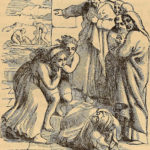We run our website the way we wished the whole internet worked: we provide high quality original content with no ads. We are funded solely by your direct support. Please consider supporting this project.

The Kingdom Stance Toward Enemies
Jesus was praying in the garden of Gethsemane, when a group of temple guards showed up to arrest him. Peter immediately drew his sword and started swinging it, cutting off a guard’s ear.
From the world’s point of view, this violence was justified. Peter was simply defending himself and his master. Yet Jesus rebuked him, reminding him that “all who draw the sword will die by the sword.” Jesus then pointed out to Peter that if he was interested in force, Jesus himself could have called on more than twelve legions of warring angels. But this, clearly, was not the kind of power Jesus was interested in employing.
Jesus then proceeded to demonstrate the kind of power he was interested in—by revealing God’s love for his aggressor and healing the man’s severed ear. Through his actions, Jesus showed that the kingdom of God relies not on the power of the sword, but the power of love that seeks to serve and heal enemies. It’s the same power he demonstrated several hours earlier when he washed the feet of his disciples.
After this, Jesus was questioned by Pilate, who asked him if he was the king of the Jews. Jesus responded, “My kingdom is not of this world.” And then he pointed to his followers’ refusal to fight as proof that his kingdom “is from another place” (John 18:36). While all the kingdoms of the world use violence to fight enemies who threaten them, Jesus commands his followers to refuse violence and serve enemies—regardless of how justified the use of violence might seem by “normal” standards.
After his encounter with Pilate, Jesus was tortured, mocked, and crucified. He had the power to avoid all this, but he chose not to use it. Why? Because he knew that using violence to protect himself, while justified by worldly standards, would not have benefited his enemies, nor would it have manifested God’s universal and unconditional love. It would not have manifested what it looks like when God reigns in someone’s life.
Had Jesus defeated his foes by asking his followers to fight for him or by calling on legions of angels, he would have manifested a high-powered version of the kingdom of the world, but he would not have manifested the kingdom of God. Had Jesus conquered his foes by force, he would have locked them into their rebellious stance against him and his Father instead of offering them the possibility of reconciliation. Had Jesus engaged in a “just war” against his foes, he would have legitimized violence rather than defeating it.
By voluntarily giving his life for his enemies—which includes you and me—Jesus made it possible for us to be transformed by the beauty of his love and to be reconciled to God. And the clearest evidence that we are being transformed by God’s love and participating in the kingdom that is not “of this world” is that we adopt the same nonviolent, self-sacrificial stance toward enemies that Jesus had.
—Adapted from The Myth of a Christian Religion, pages 94-95
Photo credit: αnnα via Visual Hunt / CC BY-NC
Category: General
Tags: Enemy Love, Kingdom of God, Love, Non-Violence, Power
Related Reading

From Good Friday to Easter
This weekend as you contemplate the suffering, death and resurrection of Jesus, we pray that God will reveal his unfathomable love for you in new ways. Blessings to all of you from all of us at ReKnew. Photo credit: Claudio via Visualhunt / CC BY

Listen and Learn: A First Step Toward Reconciliation
Jesus Christ is not just the Lord, Savior and Messiah of the Jews: he is the Lord, Savior and Messiah of all people. Through Christ a kingdom is being established that tears down tribal walls between races and re-unites and reconciles people together in the love God. Paul makes the point most forcefully. In Ephesians…

What “God Loves You” Actually Means
From the beginning, God chose to have a people who would be the object of his eternal love, just as Christ is the object of his eternal love. God sought to acquire a “bride” for Christ who would receive and reflect the love of the triune community (Eph 5:25-32). And the only qualification for being…

Who Killed Ananias and Sapphira? A Response to Paul Copan (#6)
In his critique of Crucifixion of the Warrior God (CWG), Paul Copan makes a concerted effort to argue that the God revealed in Jesus Christ and witnessed to throughout the NT is not altogether non-violent. One of the passages Copan cites against me is the famous account of Ananias and Sapphira falling down dead immediately…

Living Into the Future
Why didn’t God create a “perfect world”? Here’s Greg’s response to that question. See more at The Work of the People.

God’s Love and Your Freedom
The most distinctive aspect of the revelation of God in Christ is Jesus’ demonstration that God relies on love to defeat his enemies and to accomplish his purposes. More than anything else, it was the perfect love of God revealed in the incarnation, ministry, and self-sacrificial death of Jesus that in principle defeated evil and…
